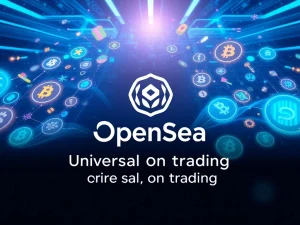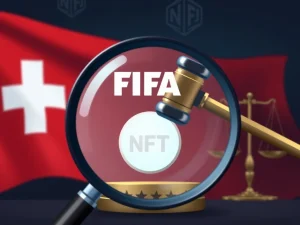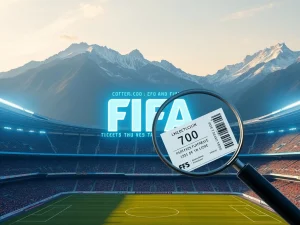Victory for NFTs: SEC Ends OpenSea Investigation in Landmark Decision

In a stunning turn of events that has sent ripples of excitement throughout the digital art and cryptocurrency world, the Securities and Exchange Commission (SEC) has officially closed its investigation into the leading NFT marketplace, OpenSea. This monumental announcement, delivered by OpenSea’s founder Devin Finzer himself, is being hailed as a significant victory for the entire NFT ecosystem and a potential turning point for crypto regulation clarity.
Decoding the SEC Drops OpenSea Probe: What Does It Really Mean?
For months, the crypto community has been holding its breath, wondering about the scope and implications of the SEC’s probe into OpenSea. While the specifics of the investigation remained largely under wraps, the mere existence of a regulatory inquiry cast a shadow of uncertainty over the burgeoning NFT market. Now, with the SEC officially dropping the investigation, a collective sigh of relief – and celebration – can be heard across the digital landscape.
But what does this really mean? Let’s break down the key takeaways:
- No Enforcement Action: The most immediate and crucial outcome is that the SEC has decided not to pursue any enforcement action against OpenSea. This is a massive win for OpenSea and provides a strong signal that their operations, at least in the areas investigated, are not deemed to be in violation of securities laws.
- Industry Validation: The closure of the investigation without charges can be interpreted as a form of implicit validation for OpenSea’s business model and potentially for the broader NFT marketplace structure. It suggests that the SEC, after scrutiny, did not find compelling evidence to categorize NFTs traded on OpenSea as securities – a critical point of contention in the crypto regulatory space.
- Boost for NFT Adoption: Regulatory uncertainty has been a major hurdle for wider NFT adoption. The SEC’s decision to drop the OpenSea probe removes a significant layer of fear and doubt, potentially encouraging more mainstream users and institutions to enter the NFT space. This clarity can unlock further innovation and investment in the NFT sector.
- Precedent Setting? While each case is unique, this outcome could set a precedent for how the SEC approaches NFT marketplaces in the future. It may indicate a more nuanced and less aggressive stance than some in the industry feared, although it’s crucial to remember that regulatory landscapes are constantly evolving.
Why is the OpenSea SEC Investigation a Hot Topic?
The **OpenSea SEC investigation** wasn’t just about one platform; it was about the future of NFTs and the regulatory framework surrounding digital assets. Here’s why it commanded so much attention:
- NFTs in the Regulatory Crosshairs: NFTs have rapidly grown from niche collectibles to a multi-billion dollar market encompassing art, music, virtual real estate, and more. This explosive growth inevitably attracted the attention of regulatory bodies worldwide, including the SEC. The question of whether certain NFTs should be classified as securities has been a central debate.
- OpenSea’s Market Dominance: OpenSea is the undisputed king of NFT marketplaces. Any investigation into OpenSea is, by extension, an investigation into a significant portion of the entire NFT market. The platform’s actions and regulatory interactions have far-reaching implications for the entire industry.
- Clarity on Crypto Regulation: The crypto industry has long sought clearer guidelines from regulators like the SEC. Ambiguity around which digital assets fall under securities laws has stifled innovation and created compliance challenges. The OpenSea case was seen as a potential bellwether for how the SEC intends to regulate NFTs and the broader digital asset space.
- Investor and Creator Confidence: The uncertainty surrounding the investigation impacted both NFT investors and creators. A negative outcome could have dampened enthusiasm and investment, while a positive resolution, like the current one, can significantly boost confidence and encourage further participation in the NFT market.
NFT Marketplace Regulation: Navigating the Uncharted Waters
The **NFT marketplace regulation** landscape is still in its nascent stages globally. Regulators are grappling with how to apply existing securities laws to this novel asset class. Here are some of the key challenges and considerations:
| Challenge | Description | Impact on NFT Marketplaces |
|---|---|---|
| Defining NFTs: | NFTs are incredibly diverse, representing everything from digital art to in-game items to access tokens. A one-size-fits-all regulatory approach is likely inappropriate. | Marketplaces need clarity on which types of NFTs might be considered securities and which are exempt. |
| Decentralization vs. Centralization: | Many NFT marketplaces operate with varying degrees of decentralization. Applying traditional regulatory frameworks designed for centralized exchanges to decentralized platforms is complex. | Marketplaces need to understand their responsibilities regarding compliance, even if they are not fully centralized entities. |
| Cross-Border Nature: | The internet and blockchain technology transcend geographical boundaries. NFT marketplaces often operate globally, making jurisdictional issues and cross-border regulation a significant hurdle. | Marketplaces may need to comply with regulations in multiple jurisdictions, adding complexity and cost. |
| Evolving Technology: | The NFT space is rapidly evolving with new use cases, technologies, and platforms emerging constantly. Regulations need to be adaptable and future-proof to keep pace with innovation. | Regulations must avoid stifling innovation while still protecting consumers and ensuring market integrity. |
The Ripple Effect: NFT Industry Win and What’s Next?
The SEC’s decision to drop the **SEC drops OpenSea probe** is undoubtedly an **NFT industry win**. It’s a moment of celebration, but also a call to action. Here’s what could be next:
- Increased Investment: With reduced regulatory uncertainty, we can expect to see increased investment flowing into NFT projects, platforms, and infrastructure. Venture capital, institutional investors, and even retail participants may feel more comfortable allocating capital to the NFT space.
- Innovation Boom: Regulatory clarity can foster innovation. Entrepreneurs and developers may be emboldened to explore new NFT use cases and push the boundaries of what’s possible with this technology, knowing the regulatory landscape is becoming clearer.
- Responsible Growth: While celebrating this win, the NFT industry must also prioritize responsible growth. This includes self-regulation, consumer protection measures, and proactive engagement with regulators to ensure the long-term health and sustainability of the market.
- Continued Dialogue: The conversation around **crypto regulation clarity** is far from over. The industry needs to maintain open communication with regulatory bodies like the SEC, providing education, feedback, and collaboration to shape sensible and effective regulations that promote innovation while mitigating risks.
Conclusion: A Defining Moment for NFTs
The SEC concluding its investigation into OpenSea without enforcement action is a landmark moment for the NFT world. It’s a victory that validates the industry’s potential and offers a glimmer of hope for greater regulatory clarity. While challenges and uncertainties remain, this decision marks a significant step forward, paving the way for continued growth, innovation, and broader adoption of NFTs. The ocean of possibilities for NFTs just got a whole lot clearer, and the industry can now navigate its future with renewed confidence and vigor.









